Wait a minute, Mr. Postman
Permanent link All Posts
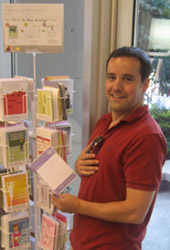
Ted Perlstein’s future is in the cards
Last year, Ted Perlstein was having drinks with friends, a couple who had recently tied the knot.
While sipping beer, the newlyweds griped about the chore of writing their wedding thank-you notes. Hearing his friends’ post-nuptial grievances got Perlstein, a Jewish Chicago-based entrepreneur, thinking about the act of sending greeting cards. “This process should be something that you look forward to,” he thought. “It should be fun.”
He did some research and found that the paper greeting card business hasn’t changed in 150 years. Here’s some random trivia for your next cocktail party: According to the Greeting Card Association, 1856 marked the start of the greeting card industry in America. For most of that time, according to Perlstein, cards were serious and pretty; the funny ones, like those ‘Over the Hill’ and couch potato cards, have only been around for a few decades.
Perlstein wanted to put his unique stamp on the industry by adding a different type of card to the mailbox. “Exchanging cards should really be more participatory. [Right now] you buy the card, you send it, and that’s it. It’s very one directional, a monologue,” he says. “On the receiving end, what do you do when you get the card? You smile, you laugh for a second, and then you have a big decision—do you throw it out, put it in a drawer, or hang it on the fridge? The process stops—it hasn’t evolved.”
In setting out to evolve the card business from monologue to dialogue, he dreamed up Fill In The Blank Greetings.
Launched last June, Fill In the Blank facilitates a personalized, playful dialogue between sender and receiver. Each card contains several cut-outs that correspond to blanks inside the card that the recipient is instructed to fill in before opening. For example, he/she might be prompted to write in “something you’d wish from a genie” or “a learned skill from elementary school.” Upon opening the card, the recipient discovers a message created with the help of their personalized responses. Then, the recipient may e-mail the creation back to the sender and family and friends on the company’s website.
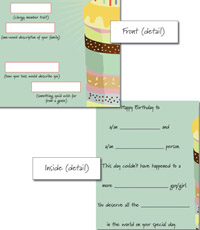
Birthday cards
The cards are reminiscent of Mad Libs, the written and sometimes gross-out game—depending on who’s filling in the responses—that Perlstein played as a kid.
Growing up in a Reform Jewish household in Atlanta—in addition to Mad Libs—Perlstein also loved numbers, electronics, and learning how things work. In college, he was pre-med and majored in engineering but, upon graduating he changed his career track. “I had an epiphany that I wanted a personal life.” He and a friend started up an internet travel company, a site they ran for five years. Their business planted the entrepreneurial seed but, at the same time, the travel bug, which he’d been promoting to his clients, also bit Perlstein. So he left the company to travel on a Birthright Israel trip and then backpacked around the world for five months before returning to school to obtain his MBA.
Post-graduation, he settled in Chicago, and again worked for a stint in the travel industry, but again, his entrepreneurial spirit propelled him to go into business for himself. “I like creating things that a lot of people can use and be happy using,” he said.
Fast-forward a couple of years and a lot of work—‘”the adage everything takes longer than you think it will is so true,” says Perlstein—and Fill In the Blank Greetings was born.
Perlstein writes all the copy for the cards himself and works with freelance artists from around the country to design the cards. Currently, he works “25 feet from my bedroom” in River North, but plans to move to a downtown office soon and hire a couple of fulltime employees as well.
“The biggest challenge is creating a card that is conservative and edgy at the same time,” he said. “You don’t just want to be the guy who makes the edgy cards because you’ll alienate a whole slew of people.”
And a slew of people have bought the cards. Since its launch two months ago, the company has sold several million cards. The cards sell for about $3 a piece, but also sell in bulk for about $2.20 a card. People may order the cards online and, eventually, purchase them at retail outlets. The business also has a Facebook group. Card selection ranges from birthday greetings to bar/bat mitzvahs to “A just because card,” Perlstein’s favorite.
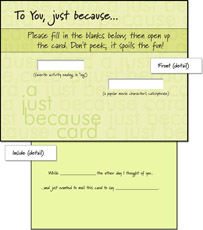
Sending a card “just because”
Political junkies can also have some fun filling in the _____ with election cards,” featured on the site. These cards enable people to reach out to friends to influence their vote before the presidential election—and choose Senators McCain and Obama’s favorite TV theme songs.
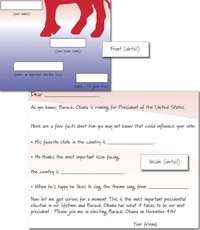
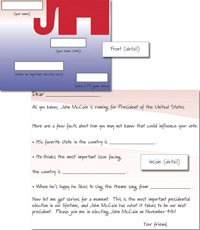
Filling in the ______for president
Perlstein hopes to expand the card selection to include Jewish cards celebrating the holidays, Jewish camping, and quotes from Jewish mothers. He also is working on a line of magnets featuring idioms and recognizable movie quotes like “You had me at _____” and “Go ahead, make my _____.” The idea is for the magnets to hold up take-out menus and invitations to create new quotes. For example, over a Japanese take-out menu, the magnet quote morphs into “Go ahead, make my sushi.”
He has some sage advice for fledgling entrepreneurs: “Don’t be afraid to fail. That’s what stops a lot of people from trying… [After all], last year at this time if you told me that I’d be a CEO of a greeting card company, I would have laughed in your face.”



.jpg)



